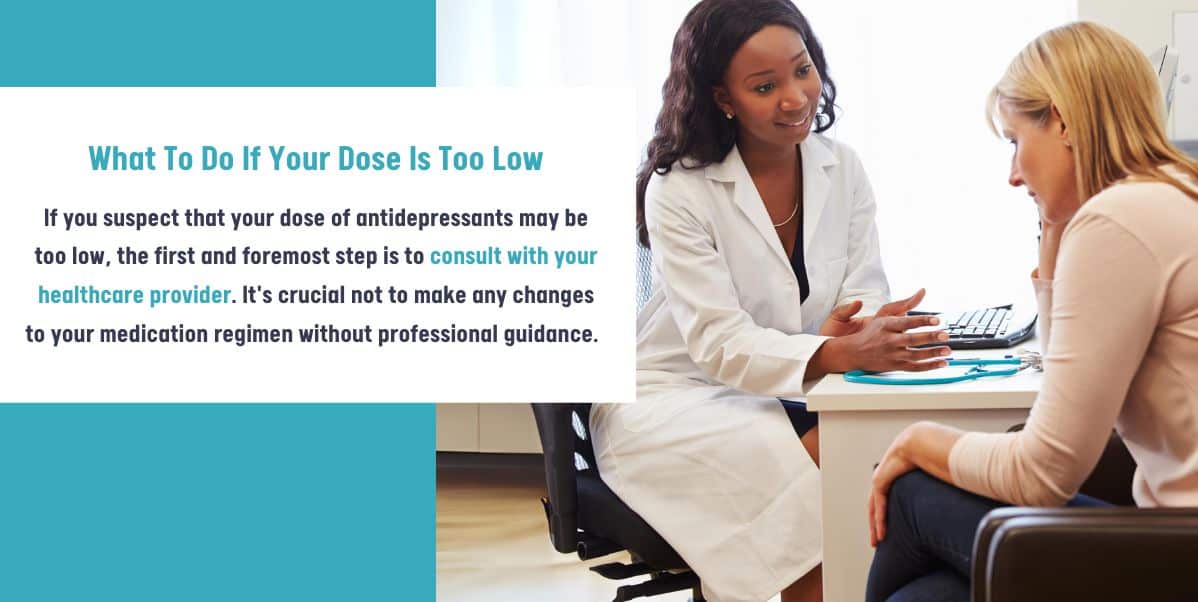
Antidepressants are a crucial tool in managing depression, but getting the dosage right is critical. Too low a dose can result in ineffective treatment, leaving you grappling with persistent symptoms of depression. But how do you know if your antidepressant dose is too low?
In this blog post, we’ll explore the signs that might indicate your antidepressant dose is insufficient. From reduced progress in therapy to negative feedback from loved ones, and even the return of specific depressive symptoms, these signs can help you identify when it’s time to reconsider your dosage.
Understanding these signs is crucial for your mental health journey. It empowers you to have more informed discussions with your healthcare provider about your medication and its effectiveness. So, let’s delve into recognizing and understanding the signs your antidepressant dose is too low.
Understanding Antidepressants
Antidepressants are medications designed to alleviate symptoms of depression. They work by balancing chemicals in your brain called neurotransmitters that affect mood and emotions. These drugs increase the availability of certain neurotransmitters, specifically serotonin, norepinephrine, and dopamine.
There are several types of antidepressants:
- Selective Serotonin Reuptake Inhibitors (SSRIs): This is the most prescribed type of antidepressant. SSRIs increase the level of serotonin in the brain. Examples include Fluoxetine (Prozac), Citalopram (Celexa), and Sertraline (Zoloft).
- Serotonin and Norepinephrine Reuptake Inhibitors (SNRIs): These medications boost serotonin and norepinephrine in the brain. Examples include Venlafaxine (Effexor) and Duloxetine (Cymbalta).
- Tricyclic Antidepressants (TCAs): These were some of the first antidepressants. They’re not as commonly used today because they have more side effects than newer antidepressants. However, they can be effective for certain people. Examples include Amitriptyline and Nortriptyline (Pamelor).
- Monoamine Oxidase Inhibitors (MAOIs): These are older antidepressants that are used less frequently due to dietary restrictions and possible side effects. An example is Phenelzine (Nardil).
Each type of antidepressant works slightly differently and can have different side effects. It’s important to talk to a healthcare provider to find the right medication for your needs.
Essential Signs Your Dose May Be Too Low
Antidepressants are meant to help manage symptoms of depression, but if the dose is too low, you may not experience the full benefits of the medication. It’s important to recognize the signs that your antidepressant dose may need to be adjusted. Here are some key signs to look out for:
- Persistent Depressive Symptoms: The most obvious sign that your dose may be too low is if your depressive symptoms persist or return. This could include feelings of sadness, hopelessness, or a lack of interest in activities you once enjoyed.
Remember that it can take a few weeks for antidepressants to start working, so if my just started the medication, give it some time. However, if you’ve been on the medication for a while and still feel depressed, it might be time to discuss your dosage with your doctor.
- Feeling of Flatness or Numbness: Some people on antidepressants report feeling emotionally “flat” or “numb.” While antidepressants can help reduce feelings of sadness, they should not completely numb all emotions.
If you’re feeling this way, it could be a sign that your dose is too low and not providing the emotional regulation you need.
- Frequent Mood Swings: Rapid and frequent changes in mood can indicate that your antidepressant dose is not high enough. If you’re experiencing mood swings from extreme happiness to deep sadness, it might mean that your medication isn’t effectively stabilizing your mood.
- Lethargy and Lack of Motivation: Depression often comes with feelings of lethargy and a lack of motivation. If you’re still feeling constantly tired or uninterested in things, despite taking your medication, this could be a sign that your dose is too low. Antidepressants should help you regain your dynamics and motivation.
- Trouble Focusing or Remembering: Difficulty with concentration and memory can also be symptoms of depression. If these symptoms persist while on medication, it could indicate that your dose is not high enough.
Remember, everyone’s body reacts differently to medication. What works for one person may not work for another. If you’re experiencing any of these signs, it’s important to discuss them with your healthcare provider.
They can help determine if a dosage adjustment is needed or if a different type of antidepressant may work better for you. It’s crucial not to adjust your dosage or stop taking your medication without consulting your doctor first, as this can lead to withdrawal symptoms or a return of your depressive symptoms.
What To Do If Your Dose Is Too Low
If you suspect that your dose of antidepressants may be too low, the first and foremost step is to consult with your healthcare provider. It’s crucial not to make any changes to your medication regimen without professional guidance. This includes both increasing your dosage and stopping your medication altogether, both of which can have serious consequences.

Your doctor can help determine if a dosage adjustment is necessary based on your symptoms and overall wellbeing. They can also guide you through the process of adjusting your dose safely, minimizing any potential side effects or withdrawal symptoms.
In some cases, your doctor may recommend changing medications entirely. Different types of antidepressants work in different ways, and what works best will depend on your individual needs and body chemistry. It’s important to remember that finding the right medication and dosage often involves some trial and error.
Finally, remember that medication is just one part of a comprehensive treatment plan for depression. Therapy, lifestyle changes, and other treatments can also play a vital role in managing your symptoms.
If you suspect your dose is too low, don’t hesitate to reach out to your healthcare provider for advice and guidance. Your mental health is important, and getting the right treatment is key to managing your symptoms effectively.
Get Professional Help Today
Recognizing the signs of a low antidepressant dose is crucial for effective mental health management. If you find yourself grappling with persistent symptoms despite medication, it might be worth exploring alternative treatments.
Transcranial Magnetic Stimulation (TMS) therapy offers a promising avenue for those seeking a safe and effective alternative to traditional antidepressant medications. By utilizing magnetic fields to stimulate nerve cells in the brain, TMS has shown success in alleviating symptoms for individuals who may not respond adequately to medication alone.
As you consider your mental health journey, consulting with a healthcare professional to explore the potential benefits of TMS therapy could be a proactive step towards achieving the balance and well-being you deserve. My TMS Therapy is here to help. Call (877) 548-8081 or fill out the contact form to book an appointment and get the support you need.


